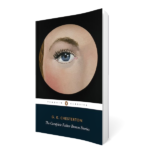There is only one kind of literature that is most successful and most appreciated when it makes us feel like a fool: detective fiction. A good mystery gives great pleasure when we come to the end of it and are dumbfounded by the solution. It is simultaneously humbling and gratifying to be surprised by a truth that has been sitting under our noses all along. Even though we did not expect the conclusion, we instantly recognize that it is the right one. All the clues were there, we just didn’t figure out what they all meant, but suddenly they all come back to us and make sense. Even those poor souls who figure out the clues ahead of time and are not surprised by the ending are not without satisfaction; they at least have the pleasure of knowing that the author is as smart as they are.
In spite of all the essays and poems and books and philosophy and social criticism that flowed from his prolific pen, G.K. Chesterton is best remembered for some detective stories he wrote. And it is fitting that it should be that way, because first of all, nothing would please him more, and secondly, almost everything he wrote falls right in line with his mystery stories, achieving the same effect of presenting a puzzle to us, leading us along, and finishing us off with the shock of truth, the surprise, the revelation of things that we should already know, the solution that is utterly appropriate but entirely unexpected. It is natural that Chesterton, master of paradox, should be master of mystery, because both involve seeing what is familiar for the first time.
Chesterton’s second collection of Father Brown stories, The Wisdom of Father Brown, solidified the character of the priest sleuth and assured him a permanent place in the annals of detective fiction. Chesterton builds on the reputation of the priest that was established in the Innocence of Father Brown, the apparently naïve priest who can quietly outwit master criminals and even master detectives; he adds wisdom to the innocence.
The first story in this collection draws attention to what sets Father Brown apart from the standard detective fare that came before him, which was only Sherlock Holmes and all the bad imitations of him. In “The Absence of Mr. Glass,” Chesterton presents a perfect satire of the super sleuth. In this case, it is Dr. Orion Hood, who, with his brilliant methods of deduction manages to get everything exactly and precisely and astonishingly wrong.
Cleverness is not the same thing as wisdom. Knowing a lot of facts is not the same thing as knowing the truth. In fact, as Father Brown points out in “The Duel of Dr. Hirsch”, “You have to know an awful lot to be wrong on every subject – like the devil.” The devil, of course, is the great deceiver, and the criminals in these stories practice deception in the form of play-acting. The actor in “The Paradise of Thieves” defines an actor as “a bundle of masks.” Father Brown has to unmask the devious actors in these tales. Twice. As Sister Mary Carol has observed, “At the end of each story we discover that the criminal has been impersonating two people.”
Chesterton gets another chance to exercise his satirical gifts in “The Purple Wig,” where he smashes the romantic notion of the newspaper editor. This is not courageous, muckraking, we’ll-print-the-truth-at-all-costs idealist, but rather a man whose main motivation is fear – fear of libel, fear of lost advertisements, fear of misprints, and fear of getting fired. With his blue pencil, he runs over a story, changing the word, “adultery” to “impropriety” and, by mere force of habit, the word “God” to the word “circumstances.” He is rightly admonished by a correspondent: “If a miracle happened in your office, you’d have to hush it up.”
There is a fairly good explanation for Chesterton’s exasperation with newspaper editors at this point in his life. His brother Cecil, who had exposed government corruption in high places, was suffering at the hands of those he had accused by being sued for libel, and the major newspapers suddenly went spineless. Instead of demanding justice and a full investigation of the Marconi Scandal, including the resignation of its principals, the newspapers whitewashed the central crime and clucked and fussed about minor matters. Sound familiar?
The twelve mysteries that form this collection are the shortest of the Father Brown stories, and they all appeared in Pall Mall magazine before being gathered into this book. Brownian scholar Lynette Hunter believes that in the early Father Brown stories, the priest always experienced “a moment of crisis” before reaching the solution. Whether or not we agree, we can certainly argue that with the appearance of this book, Chesterton himself experienced a moment of crisis. He suffered a complete physical collapse that nearly killed him and left him semi-comatose from the fall of 1914 until Easter of 1915. Chesterton returned to a full workload upon his recovery and was as prolific as ever. But it would be more than a decade before Father Brown made his next appearance.

